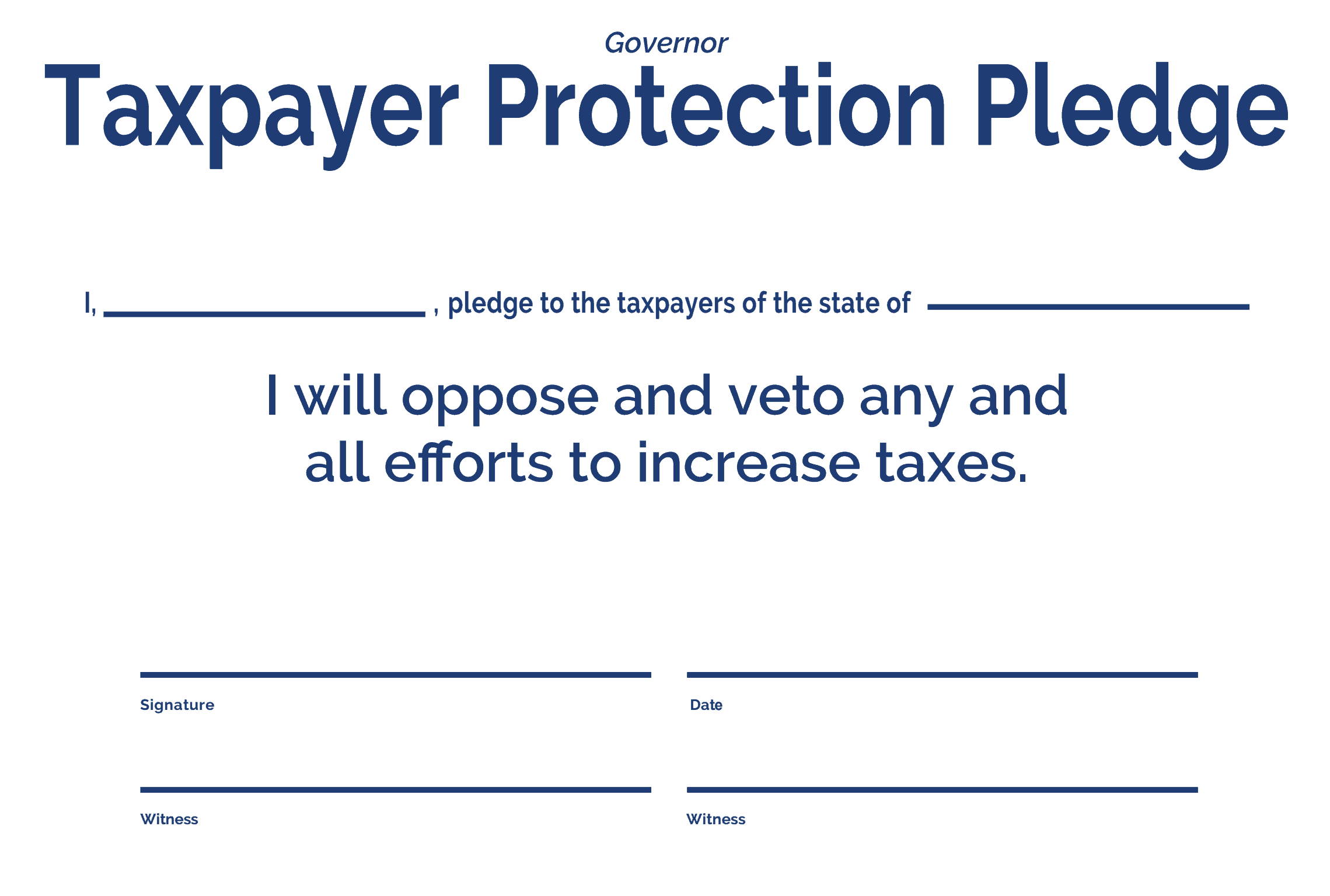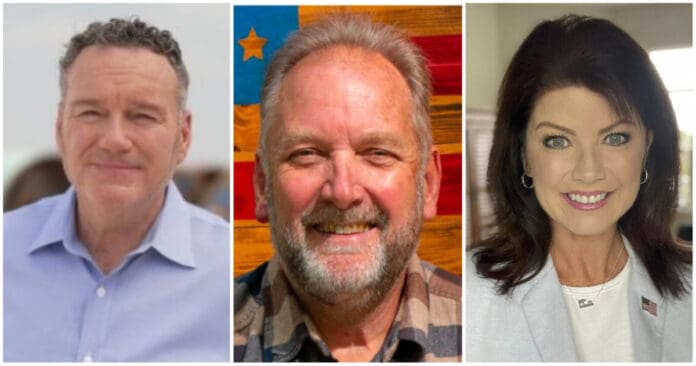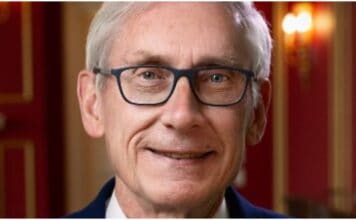The Republican candidates agree on many issues, but on these 6 things, they diverge.
Conservative talk radio host Dan O’Donnell held a spirited, informative, and issues-oriented debate attended by GOP gubernatorial candidates Tim Michels, Rebecca Kleefisch, and Tim Ramthun.
The candidates agreed on a number of issues (crime, abortion, the Second Amendment.) However, we pulled out 6 key differences that emerged among the candidates during the July 27, 2022, debate, including fireworks over the gas tax. You can watch the Dan O’Donnell debate in full below. It was the second time the three candidates have debated before the Aug. 9 primary.
The 6 differences are:
1. Americans for Tax Reform Pledge

Kleefisch and Michels disagreed on whether to sign the Americans for Tax Reform no-tax pledge (see above.) Kleefisch has signed it. Michels has not.
Kleefisch said, “I have signed, and I am the only candidate for governor who has signed” the pledge. She said, “I pledge to never do any net tax increases in the state of Wisconsin.”
O’Donnell pointed out that both Kleefisch and former candidate Kevin Nicholson had signed the pledge and asked Michels why he had not.
Michels said, “You have these lobbyists in Washington D.C. They have a business model if you will. They run across the country and get candidates to sign these tax pledges, and they get money from this.”
He said that these individuals are sitting “in their walnut-paneled, marbled offices on K Street in Washington D.C.”
Michels said he did not need to sign a tax pledge in order to ensure people he won’t raise taxes. Instead, he said he would “shake your hand, look you in the eye.”
“I don’t need to sign a tax pledge,” Michels said. Instead, he said he would “give you my pledge right now. I’m not going to raise taxes.” He said he wants to “get political gamesmanship out of politics.”
The pledge has been signed by many prominent figures outside Wisconsin, like GOP Governors Ron DeSantis, Kristi Noem and Greg Abbott, and inside Wisconsin, like U.S. Sen. Ron Johnson and Congressman Bryan Steil, both Republicans.
You can see who else has signed the pledge here.
According to its website, the group “was founded in 1985 by Grover Norquist at the request of President Reagan…The government’s power to control one’s life derives from its power to tax. We believe that power should be minimized.” Norquist endorsed Kleefisch last April.
The organization slammed Michels after the O’Donnell debate, writing, “It’s understandable that Michels would want to duck that question. The fact is, if Tim Michels wins the nomination on August 9, Wisconsin voters’ only option for governor this November would be two candidates who are both open to tax hikes,” referring also to Democratic Gov. Tony Evers. Read their full statement here.
2. Minimum Markup Law
Ramthun and Kleefisch disagreed on the minimum markup law. What is that? “Commonly referred to as the “Minimum Markup Law,” the Unfair Sales Act prohibits selling items of merchandise below cost,” the state’s website says.
Ramthun said, “Minimum markup keeps the mom-and-pop shops in business. It doesn’t allow for monopolies to occur. It allows for accessibility for all people to get a hold of the product.”
As a result, he said that he was “somewhat apprehensive about repealing that.” He said it “could cause issues with stations going under and people’s businesses failing.” He said he would talk to the Legislature about such a bill and the effects it could have, saying, “I don’t want to move a problem…I’ll definitely look at it with the Legislature.”
Kleefisch was asked about minimum markup as well, and she said, “I would reform minimum markup,” adding, “You can also invest in roads at the same time you protect taxpayers.” She did not specify the nature of those reforms.
[Note: As O’Donnell noted, Scott Walker did not repeal minimum markup during his tenure as governor but said in 2010 that he would support changes to it. Kleefisch was his lieutenant governor. In 2018, he opposed repealing minimum markup as part of a compromise that also included a gas tax hike, which he opposed. Former GOP gubernatorial candidate Kevin Nicholson had called for repeal of minimum markup, saying, “Today, state law requires a 9.18% markup to wholesale gas prices in Wisconsin.” For his part, Michels has said previously that he is open to repealing minimum markup. Read more about that here.]
3. Waste in the State Transportation Budget
Michels and Kleefisch disagreed on waste in the state’s Transportation Budget.
Kleefisch said, “Unlike my opponent, I’ve said there is waste, fraud and abuse in government and in the Department of Transportation. I’ve seen it myself.”
She was referring to Michels.
Michels clarified that what he said previously on this topic was that “what I said was there is no waste, fraud and abuse in the transportation construction budget.” He said there is about a billion dollars in the annual budget for building and maintaining roads.
He said it was “highly competitive,” and he was “intimately familiar with that, of course.”
Michels said that, in the last 10 years, the “cumulative total” of savings by the “low bid contractor” has been $397 million less than the Department of Transportation engineer “estimate.”
[Note: Michels’ family-run company, Michels Corp., has received DOT contracts for public works projects.]
4. Michels & the Gas Tax
The biggest fireworks in the debate came when O’Donnell pointed out that Michels was president of the board of the Wisconsin Transportation Builders Association, a group that O’Donnell said has for decades advocated for raising the state’s gas tax. In addition, the Transportation Development Association was advocating for a gas tax increase at the same time Michels was serving on its executive committee, said O’Donnell. He asked how Michels squares his current opposition to raising the gas tax with his leadership of groups that have openly advocated for doing just that.
Michels responded that only 8 percent of Michels Corp.’s business is government contracts in total, with 4 percent of that being Wisconsin roadbuilding. The rest of the business is “non DOT work,” he said, and that business consumes “massive amounts of fossil fuel, of gasoline and diesel. I would have to be the dumbest businessman in the history of the world to want to raise fuel costs, to want to raise the cost on 96% of my business.” [Gas tax revenue helps fund the state Transportation Fund.]
Michels said that is “what I told these people when I was on these organizations.” He said he’s a “capitalist” and “fiscal conservative” and said it’s bad policy. “I have never once said I wanted to raise the gas tax.” He said it was “very unfair” and “very disingenuous” of Kleefisch to say he is a “gas tax raiser.” He said people “know it’s not true” and find it “upsetting.”
O’Donnell said to Kleefisch, “You did say in recent commercials, ‘Tim Michels pushed aggressively for gas tax increases.’ Do you have evidence of that? He says you are not being honest.”
Kleefisch responded, “You just cited the evidence, Dan. And anyone who is interested can just look online and find very easily articles that point to the fact that Tim, who just admitted that he was the leader and on the boards of these organizations that lobbied for years to raise the gas tax, was in fact a leader.”
She questioned his claim that “you told these people when you were leader of the organizations,” asking Michels, “Do your people who you say you lead just not listen or are you not taking responsibility?”
Michels said it was “not authoritarian rule when you’re a leader of an organization. You need to come to a consensus.” If people can’t, so be it. “I didn’t agree with everything the transportation associations stand for as well.”
He added, “I still haven’t heard where you have evidence that I have ever said I would raise the gas tax and you don’t have it because I never said it.”
He asked for evidence that he tried to raise the gas tax, and she said, “I’ll text you. It’s an article from Wisconsin Right Now. It says following paper trails that directly say that Michels Corporation even donated directly to efforts to raise the gas tax. But that’s not the only place.”
She added that the “organizations you were the leader of, despite you saying you were against illegal immigrants, fought to ensure government contracts for companies that hire illegal workers…You have got to take responsibility for some of these organizations. Michels Corp. let people have the day off to protest our right to work legislation.”
Michels said he has “read these articles,” adding, “it just connects the dots, it says he was in these trade organizations, therefore he must. My word is good.” He said he doesn’t have an “integrity problem,” mentioning that he was an Army Ranger.
He said he has “never said I will raise gas taxes, and I pledge I will never raise gas taxes. You can take it to the bank.”
Kleefisch responded, “It’s a taking responsibility problem.”
Since Wisconsin Right Now’s previous reporting on Michels’ involvement in these groups was cited in the debate by both sides, we would strongly encourage you to read the full story we wrote here. Not a single fact, and not a single piece of wording, in this article, has ever been refuted by anyone, including Michels and Kleefisch.
Thus, the actual story (as opposed to what campaigns and candidates say about it), provides a good roadmap for documented and unchallenged facts on this contentious topic. What did we actually write?
The lead of our story reads, “For years, Republican gubernatorial candidate Tim Michels and his family-run company have been involved in groups that pushed aggressively for increases in the Wisconsin gas tax and vehicle registration fees, Wisconsin Right Now has documented.”
That story also broke the illegal immigrant angle. It reported, “Michels was also board president of a group that opposed a bill that would have stopped companies that employ illegal immigrants from getting government contracts.” The story provides extensive documentation and details.
The story also noted:
“A Michels Corp. subsidiary, Michels Pipeline Construction, contributed nearly $20,000 to the California Alliance for Jobs – Rebuild California PAC. The group was the largest contributor to the No Proposition 6 Campaign, which opposed a repeal of the state’s gas tax hike.
Michels Corp. and Michels Pipeline Construction also gave to groups in Illinois that favored raising the gas tax. They contributed to the International Union of Operating Engineers Local 150 PAC and to its Statesman of the Year State and Local PAC. IUOE Local 150 supported Democrat Gov. J.B. Pritzker’s $41 billion transportation plan that included a gas tax hike and increased registration fees. Pritzker later signed legislation that doubled the state’s gas taxes.”
It notes that Michels has funded groups through memberships and company reps have sat on the boards. The story also outlined how other leaders of the groups have trashed Walker, praised Evers, and urged increases in the gas tax.
Again, in order to assess candidates’ comments about what Wisconsin Right Now reported (not to mention the ad and direct mail wars, which we have no control over, either), we encourage you to read our actual story in full.
5. The Wisconsin Election Commission: WEC 2.0?
Kleefisch and Michels exchanged words relating to the Wisconsin Election Commission or WEC. O’Donnell noted that it was formed after the “lawlessness” of the former Government Accountability Board, adding that, before that, there were problems with the state Elections Board. He asked the candidates what they would specifically do to replace WEC “with a system that finally works.”
Michels said he took a “hard look” at WEC when people started asking him about it on “day one.” Initially, he acknowledged that he said he would take a “look at this. Maybe it can be reformed,” saying that’s a process he uses in business.
After two-three weeks, he said, he realized “it was an unsolvable problem. We have to disband WEC and start over.” He said that WEC “was started during the Walker-Kleefisch administration” and it “took my opponent 8-10 years to decide WEC needed to be dissolved.”
Then, he said, he wanted “better representation of the people in Wisconsin on the WEC board.” He said he wanted “great representation of the people of Wisconsin, more accountable than it is now.” He said he does not want the Secretary of State in charge of elections because we “need to have more than one person that is accountable.”
Kleefisch responded, “He just said we are going to have better representation of the people of Wisconsin on the WEC board, but he also just said we are getting rid of WEC, so I’m totally confused by that answer.” She said she was the only candidate who had “sued the WEC” and said we need to “get rid” of it because it is a “completely lawless agency.”
Michels said he was “in error when I said WEC. I am talking about the new WEC. I think people are smart, and they realize what I am referring to.” He said the board, under his plan, would be represented by “one appointee from each Congressional district.” He said that seems fair. He referred to the “new, whatever the replacement is, the WEC 2.0 board.”
Ramthun said that “the WEC broke 16 laws in the 2020 election and up until today, two years later, no one has been held accountable yet.” He said the board should have been “stopped” much earlier.
6. The ‘Flat Tax’
Michels and Kleefisch differed in their responses on the notion of a “flat tax.”
Kleefisch promised “massive welfare reform,” and then said she would “drive our income tax rate down to 3.54 percent, hold that lowest tax bracket harmless and drive everyone else’s taxes way down low.” She also promised to “eliminate the retirement tax,” and “eliminate the personal property tax once and for all, which Tony Evers has vetoed.” She added: “And I will never raise the gas tax.”
Michels said the people in Wisconsin have been overtaxed. “They’ve been overtaxed by about $5.4 billion. Some in Madison that will celebrate that, mostly on the left, and say this is great, we have all this money, but that’s on top of a rainy day fund that’s just under $2 billion,” he said.
As for the surpluses, he said, “We should not be stockpiling money in Madison; people are overtaxed. I am going to do tax reform as governor.” He said he would work with the Legislature, and “we are going to lower taxes anywhere and everywhere you can. But you have to do the math.”
He continued, “For example, If we want to reduce the income tax right now about $17 billion out of the annual $44 billion in revenue that comes in from taxes is from the income tax. If we’re going to reduce that by 15%, you’re going to have about a $2.5 billion reduction in revenue, which is great, the people are being taxed by $2.5 billion less and you can do that if you have a $5.4 billion surplus right now. So we can look at the math on all of this. I’m great at math; I’d love to go further into the numbers.”
He noted, “We just want to make sure that we are not doing an offset that can not be overcome. For example, if you completely eliminate the property tax, which is about $2.3 billion of revenue, you would eat into the $5.4 billion surplus in about the second month of the second annual budget. So I’m going to do the math, and lower taxes everywhere I can.”
He said the “personal property tax, that’s an easy one. It’s a $2 million tax cut we can do right away.”
Table of Contents











![Governor Caught Playing Politics with Brillion Residents’ Lives & Livelihood [COLUMN] ron tusler](https://www.wisconsinrightnow.com/wp-content/uploads/2025/07/MixCollage-15-Jul-2025-03-35-PM-9568-356x220.jpg)


![Protecting Portland: No Good Deed Goes Unpunished [REVIEW]](https://www.wisconsinrightnow.com/wp-content/uploads/2025/07/portland-356x220.jpg)


















